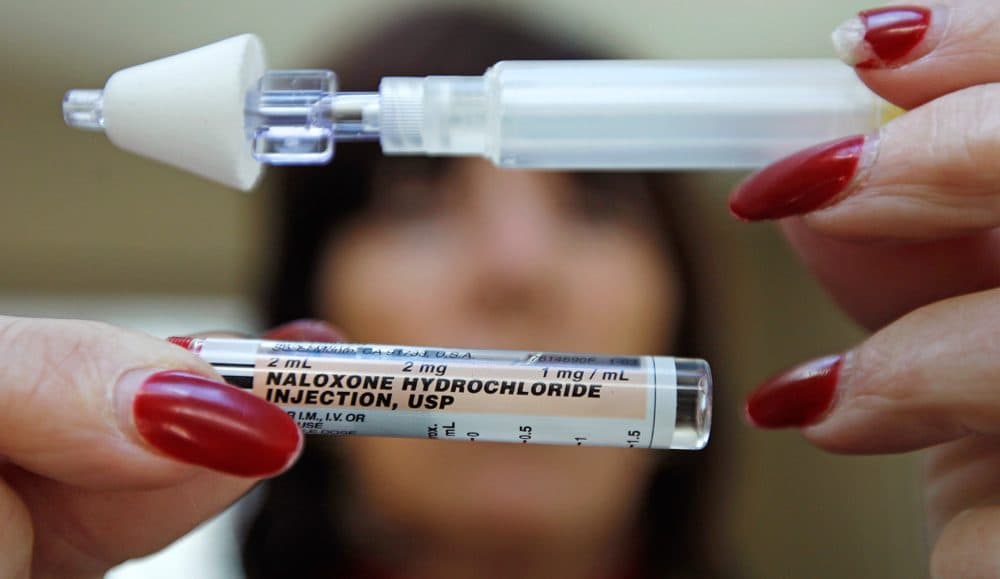Advertisement
Walgreens Joins Gloucester Police Effort To Offer Discounted Anti-Overdose Drug

The Gloucester Police Department is partnering with local pharmacies to fight drug addiction in the city by making the anti-overdose drug Narcan more affordable for those without health insurance.
Walgreens is the latest pharmacy to join the department's efforts to combat the opioid crisis, Gloucester police announced Wednesday. Conley's, a local drug store, has been on-board since the beginning of the month and CVS joined shortly after, Gloucester Police Chief Leonard Campanello said. The Walgreens in Gloucester is the only 24-hour pharmacy in the city, providing around-the-clock access to Narcan.
"It's an opportunity to make a product more readily available to individuals who are really in need and may benefit from it," said Phil Caruso, a spokesman for Walgreens.
Gloucester police want to get Narcan in the hands of addicts, families and caregivers to prevent overdose deaths, particularly when the police aren't there or aren't called. The initiative will offer discounted Narcan to people who are uninsured. Gloucester Police will subsidize the cost of Narcan for those who are uninsured using the department's seizure funds — federal and state money they acquire from the adjudication of drug cases. Typically, those funds can be used for anything law enforcement related, from vehicles to uniforms.
"The irony there is that we’re taking the money away from drug dealers and using it to pay for life-saving medications of people that they get addicted to this drug."
Gloucester Police Chief Leonard Campanello
"The irony there is that we’re taking the money away from drug dealers and using it to pay for life-saving medications of people that they get addicted to this drug," Gloucester Police Chief Leonard Campanello said.
Here's how it works: When an uninsured person walks into a particular pharmacy and asks for Narcan, the pharmacy sends the bill to Gloucester police and the department picks up the tab, Campanello said.
"We’re initially offering each person that comes in one supply every 30 days so that we can make sure we at least get a supply to everyone who comes in in Gloucester," he said.
The partnerships with local pharmacies are part of a new approach by Campanello's department to deal with the opioid epidemic that is affecting Gloucester and other communities in Massachusetts. Campanello said the department felt the need to step in when they learned it could cost up to $120 for Narcan if you don't have insurance and just a few bucks if you do.
"We weren’t going to make a distinction ... on whose life was more valuable," Campanello said.
The department outlined its plan to fight the opioid crisis in a May 4 Facebook post. As we previously reported, the police department said it will no longer arrest drug users who ask officers for help with their addiction. Under the new policy, which goes in effect June 1, if a drug user voluntarily comes to the police station, surrenders their drugs and asks for help, police will help that person get into treatment instead of arresting them.
The police department will also give addicts caught in possession of drugs the opportunity to avoid being charged if they complete an inpatient recovery program.
Opioid overdoses have risen in Massachusetts over the last few years. In April, state health officials said more than 1,000 people died of opioid-related overdoses last year — a 3.3 percent increase from 2013 and a 33 percent jump from 2012. A report from Gov. Charlie Baker's task force, charged with developing a strategy for fighting opioid addiction, is due out this month. In Boston, a new report released Wednesday found the city doesn't have enough substance abuse treatment beds and lacks coordination between treatment programs.
Campanello said resources are always a concern, but his department has "taken a stand that addiction is a disease" and he feels law enforcement can "do more on the demand side in addition to the supply side."
The department has received an outpouring of support for its new plan from across the country and overseas as well as treatment centers offering to provide outpatient services and beds for people that can't afford it, Campanello said.
"It's important for entities that are stakeholders in this issue to take note of how much support the small city of Gloucester was able to generate just by one Facebook post," Campanello said. "We’re going to continue to make the conversation go as far as it can."
And Campanello has taken his plan to fight opioid addiction to Washington. Last week he met with lawmakers, including Sen. Elizabeth Warren, Sen. Ed Markey and Rep. Seth Moulton, to discuss different approaches to dealing with drug addiction. He also called on Congress to earmark a portion of federal criminal seizure funds specifically for addiction recovery.
"What I got out of that was strong commitments from all three legislators about exploring the options for federal seizure money, about introducing legislation that would earmark monies for addiction recovery and a commitment to continue working towards the model that we’re trying to get starting here in Gloucester," Campanello said.
